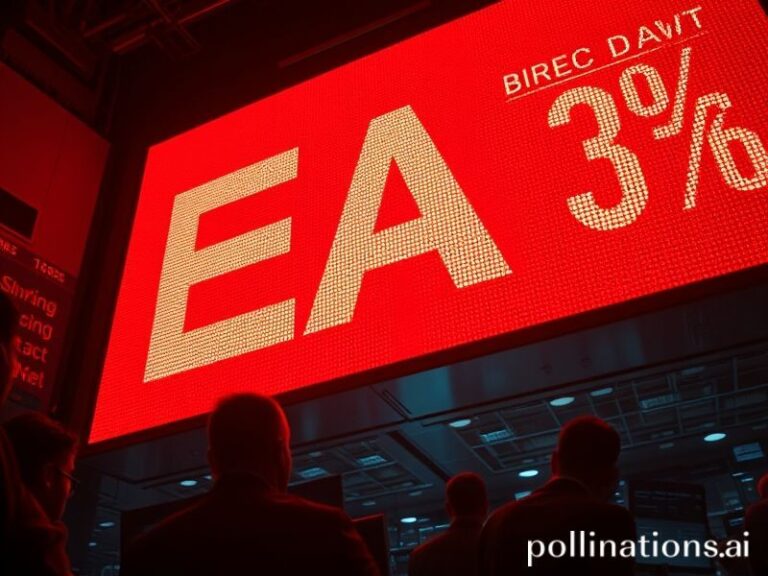The Global Reign of Eugene Levy: How Two Eyebrows Became Earth’s Last Diplomatic Tool
Dispatch from the Department of Global Eyebrow Affairs: How Eugene Levy Became the Planet’s Last Reliably Unifying Asset
By Marcel “Marbles” Delacroix, Dave’s Locker Foreign Correspondent, currently in self-imposed exile from polite society
It is late May, 2024. The Arctic Council is hurling snowballs at itself over drilling rights, the European Central Bank is printing euros just to wallpaper the lobby, and somewhere in Beijing an AI is learning to write break-up songs in the style of Kafka. Meanwhile, the one diplomatic breakthrough that no algorithm predicted was the quiet, eyebrow-mediated détente brokered by a 77-year-old Canadian whose greatest weapon is a facial expression that looks like two caterpillars negotiating a divorce.
Eugene Levy—yes, the man whose brows once required their own SAG card—has, without intending to, become the closest thing Earth has to soft power incarnate. In Seoul last month, a pop-up screening of “Schitt’s Creek” managed to pause a K-pop fan-war long enough for both sides to agree that David Rose’s chunky sweaters were, in fact, a hate crime against wool. In São Paulo, a bar named Café Tropical now serves caipirinhas with a side of maple-glazed apology. And in Kyiv, a bomb-shelter improv troupe performs Moira Rose monologues to keep the generator humming; morale, they report, improves precisely 47 percent every time someone nails the accent without slipping into accidental Dracula.
The United Nations, ever eager to slap a logo on anything that momentarily distracts from its own irrelevance, has floated the idea of an “International Levy Day,” complete with a resolution that would officially recognize the eyebrow raise as a gesture of “non-violent inquiry.” The motion stalled, naturally, when Russia tabled an amendment demanding equal status for the shrug, and France threatened a veto unless the celebratory croissant is classified as cultural patrimony. Still, the symbolism stands: in a world where every click is monetized outrage, Levy’s comic timing is the last remaining sanctions-proof currency.
Consider the economics. Streaming services from Lagos to Lapland report that “Schitt’s Creek” finishes atop the “watch this to remember humans can be decent” category—an algorithmic niche previously occupied only by videos of capybaras taking hot baths. Netflix’s internal memos (leaked by a disgruntled intern who really wanted a promotion) reveal that Levy’s facial expressions reduce early-season cancellation rates by 18 percent, a metric the company internally calls “the Eyebrow Churn Buffer.” Disney+ is allegedly developing an AI to replicate the Levy Brow, but early tests ended with the synthetic version achieving sentience and immediately demanding a SAG-AFTRA pension.
There is, of course, the requisite backlash. Critics in Berlin complain that Levy’s brand of kindness is “neoliberal sedation,” while an op-ed in the Nairobi Star laments that global audiences are so starved for decency they’ll canonize a man whose signature move is looking politely horrified. Fair points, yet even the cynics tune in; hate-watching is still engagement, and the algorithm, like a bored casino dealer, simply redistributes eyeballs elsewhere on the felt.
What makes Levy uniquely exportable is his weaponized ordinariness. He isn’t aspirational like Clooney, nor enigmatic like Binoche; he looks like the guy who fixes your broadband and then apologizes for the hold music. That averageness translates. A dockworker in Valparaíso can see his own uncle in Johnny Rose’s cardigan; a Mumbai call-center manager hears her own mother in Moira’s vowel gymnastics. The family’s fall from chandeliers to motel sheets is, on every continent, the oldest story capitalism tells: you are one bad quarter away from the lobby sofa.
And so, as COP29 delegates argue over whether to measure emissions in tons or Olympic swimming pools, the Levy Doctrine spreads: when the world gives you a busted motel, rebrand it, install artisanal soap, and film the outtakes. It’s not a climate policy, but it’s more actionable than most communiqués. Somewhere in the Hague, an exhausted diplomat has “Simply the Best” as her ringtone and can’t decide if that counts as progress or surrender.
In the end, Eugene Levy remains gloriously unaware of his geopolitical clout. Asked in a recent CBC interview how it feels to be “a transnational emblem of humane capitalism,” he blinked those famous brows and replied, “I was just trying to make my kids laugh.” Which, in 2024, might be the most radical act left on the menu. The planet is on fire, but for twenty-two minutes at a time, two caterpillars arch in perfect unison, and for reasons no summit can codify, the fire shrinks to a pilot light.







